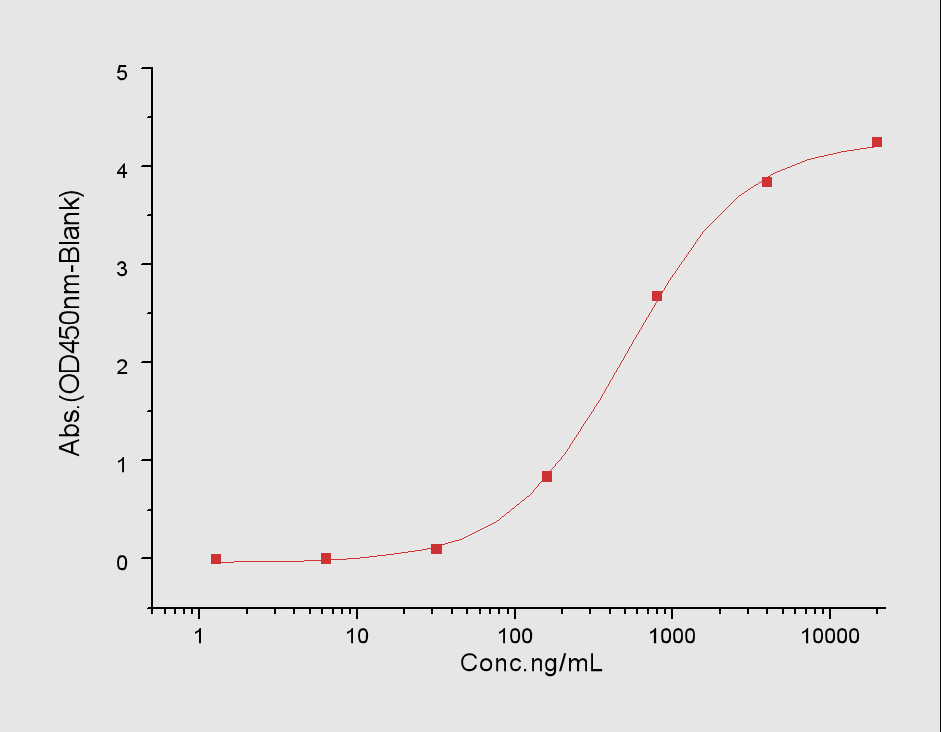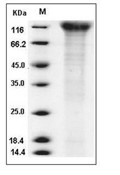Shopping Cart
- Remove All
 Your shopping cart is currently empty
Your shopping cart is currently empty

CD96 Protein, Human, Recombinant (His) is expressed in HEK293 mammalian cells with His tag. The predicted molecular weight is 55 kDa and the accession number is P40200-2.

| Pack Size | Price | Availability | Quantity |
|---|---|---|---|
| 100 μg | $451 | In Stock | |
| 200 μg | $798 | 7-10 days | |
| 500 μg | $1,690 | 7-10 days |
| Biological Activity | Measured by its binding ability in a functional ELISA. Immobilized Human CD155/PVR hFc at 2 μg/ml (100 μl/well) can bind Human CD96 His , the EC50 of Human CD96 His is 200-800 ng/mL.  |
| Description | CD96 Protein, Human, Recombinant (His) is expressed in HEK293 mammalian cells with His tag. The predicted molecular weight is 55 kDa and the accession number is P40200-2. |
| Species | Human |
| Expression System | HEK293 Cells |
| Tag | C-His |
| Accession Number | P40200-2 |
| Synonyms | TACTILE,CD96 molecule |
| Construction | A DNA sequence encoding the human CD96 isoform 2 (P40200-2) extracellular domain (Met 1-Met 503) was expressed, with a polyhistidine tag at the C-terminus. Predicted N terminal: Val 22 |
| Protein Purity | > 90 % as determined by SDS-PAGE  |
| Molecular Weight | 55 kDa (predicted); 120-130 kDa (reducing condition, due to glycosylation) |
| Endotoxin | < 1.0 EU/μg of the protein as determined by the LAL method. |
| Formulation | Lyophilized from a solution filtered through a 0.22 μm filter, containing PBS, pH 7.4. Typically, a mixture containing 5% to 8% trehalose, mannitol, and 0.01% Tween 80 is incorporated as a protective agent before lyophilization. |
| Reconstitution | A Certificate of Analysis (CoA) containing reconstitution instructions is included with the products. Please refer to the CoA for detailed information. |
| Stability & Storage | It is recommended to store recombinant proteins at -20°C to -80°C for future use. Lyophilized powders can be stably stored for over 12 months, while liquid products can be stored for 6-12 months at -80°C. For reconstituted protein solutions, the solution can be stored at -20°C to -80°C for at least 3 months. Please avoid multiple freeze-thaw cycles and store products in aliquots. |
| Shipping | In general, Lyophilized powders are shipping with blue ice. |
| Research Background | The cluster of differentiation (CD) system is commonly used as cell markers in Immunophenotyping. Different kinds of cells in the immune system can be identified through the surface CD molecules associating with the immune function of the cell. There are more than 320 CD unique clusters and subclusters have been identified. Some of the CD molecules serve as receptors or ligands important to the cell through initiating a signal cascade which then alter the behavior of the cell. Some CD proteins do not take part in cell signal process but have other functions such as cell adhesion. The CD155 ligand CD96 is a member of the Ig superfamily. It's an immunoglobulin-like protein tentatively allocated to the repertoire of human NK receptors. NK cells recognize poliovirus receptor (PVR), a nectins and nectin-like protein family member serve to mediate cell-cell adhesion, cell migration, with the presence of an additional receptor, CD96. CD96 promotes NK cell adhesion to target cells expressing PVR, stimulates cytotoxicity of activated NK cells, and mediates acquisition of PVR from target cells. The effect the cells with mutated CD96 protein lost adhesion and growth activities indicates that CD96 mutations may cause a form of the C syndrome by interfering with cell adhesion and growth.Cancer ImmunotherapyImmune CheckpointImmunotherapyTargeted Therapy |

Copyright © 2015-2025 TargetMol Chemicals Inc. All Rights Reserved.